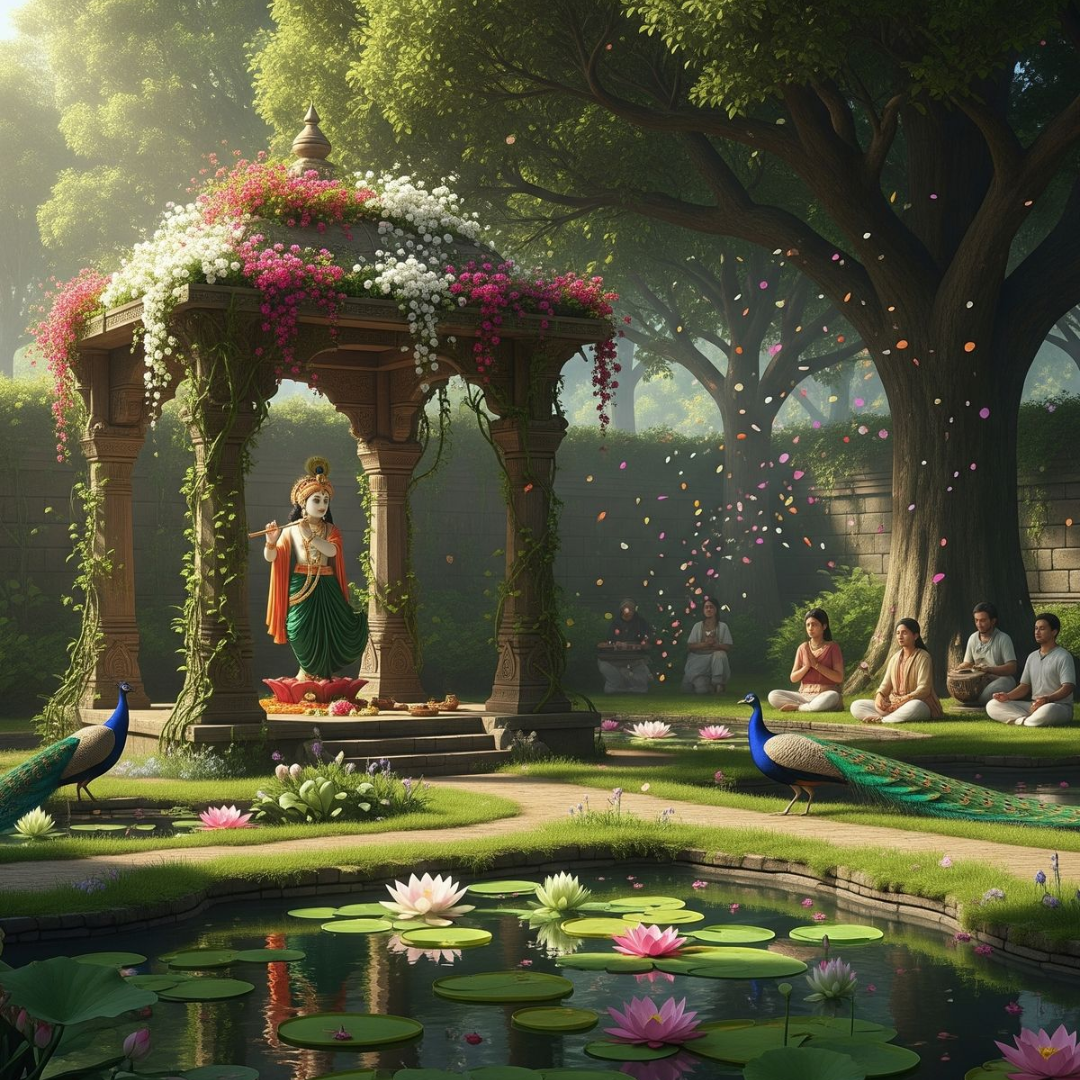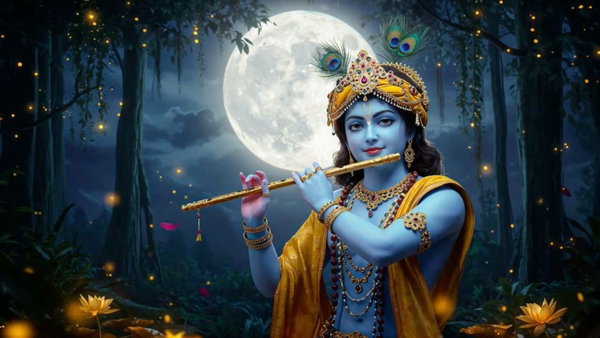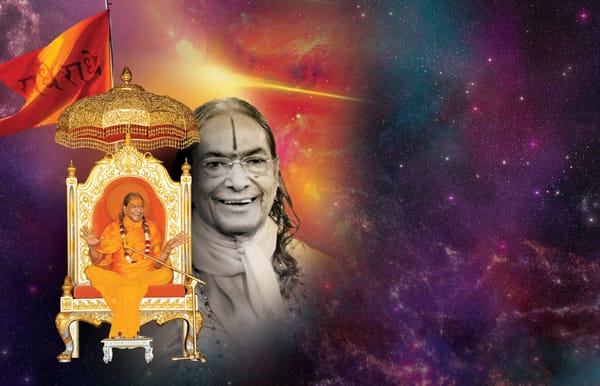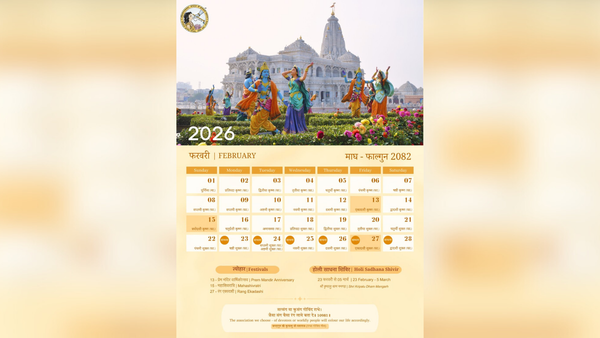Daily Devotion - Sep 21, 2025 (English)- Narad Bhakti Darshan - Part 8

Nārad Bhakti Darshan - Next Part
Methods of Kīrtan
- Vyās paddhati: Singing kīrtan aloud, narrating or listening to the divine pastimes of God.
- Nārad paddhati: Not merely listening silently, but also singing the names, qualities, and pastimes of God aloud, accompanied by musical instruments such as harmonium, tabla, sitar, or whatever instruments are available.
- Hanumat paddhati: This also involves kīrtan, where words are sung aloud, but it also includes dance, which in everyday language is called jumping around. When the surge of love becomes intense and cannot be controlled - nr̥tyati lokabāhyaḥ - then one begins to dance.
All these combined together is called kīrtan.
But whether you listen to spiritual discourses, deliver them, perform kīrtans with musical instruments, or dance, you must pay special attention to the third practice in all places and under all circumstances -
Smartavyaścechchatābhayam -
Remembrance of Shri Krishna.
For example, in the world, when you call someone, you first remember them and then take their name. Sometimes the name does not come to your mind quickly. So you say, "Hey! Where is that person who came from Bareilly? What is his name? Oh yes, Sundarlal." This means remembrance came first, the name came later.
Similarly, you must remember God first. Whether you take God's name afterwards or not, both have equal value. But remembrance is the main thing.
So these three types of Bhakti (śrotavyaḥ, kīrtitavyaśca, smartavyaśca) are indeed the primary ones.
Actually, Bhakti can be of infinite kinds -
Yena kena prakāreṇa manaḥ kr̥ṣṇe niveśayet.
By whichever means your mind gets attached to God - that alone is called Bhakti - that is Sādhana Bhakti.
According to the mental impressions (sanskārs) of previous lives, everyone has their own nature, inclination and interests. Practice Bhakti in any way according to these, but keep only this in mind - that the mind should be attached to God.
Later on, this śrotavyaḥ will also come to an end, kīrtitavyaś will also end, only smartavyaḥ will remain.
So Yajjñātvā -
- matto bhavati, stabdho bhavati, ātmārāmo bhavati -
To understand this later part of the sutra, we must first understand the characteristics of a saint.
Just as God has contradictory qualities, so do saints.
Kvacicchiṣṭāḥ kvacicdbhraṣṭāḥ kvacicdbhūta piśācavat
kvacittadbhāvanāyuktastanmayo'nucakāra ha
Sometimes the devotee forgets that he is a devotee and considers himself to be God, and also begins to imitate God (tanmayo'nucakāra).
For example: - When Shri Krishna disappeared from the Rās dance, the Gopīs imitated Shri Krishna's pastimes. But that imitation was not done consciously.
- Ramkrishna Paramhams took a flower garland to adorn Mother Durgā, raised his hands, then crying out, "Mā Mā Mā Mā Mā," he put it on himself - considering himself to be the Mother.
But these are states of divine love -
Jāra citte kr̥ṣṇa premā kare udaya tāra vākya kriyā mudrā vijñe na bujhaya.
Antarvāṇī bhiropyasya mudrā suṣṭhusudurgamā.
Even great yogis and sages cannot understand the actions, words, gestures, and activities of a devotee because they contain two contradictory elements.
Matto bhavati and stabdho bhavati - these are both contradictory terms:
- Matto bhavati (becoming intoxicated) - He becomes mad, like someone who becomes crazy after drinking alcohol.
Vāg gadgadā dravate yasya cittaṁ rudatyabhīkṣṇaṁ hasati kvacicca
Vilajja udgāyati nr̥tyate ca madbhaktiyukto bhuvanaṁ punāti
Evaṁvrataḥ svapriyaniāmakīrtyā jātānurāgo drutacitta uccaiḥ
Hasatyatho roditi rauti gāyatyunmādavannr̥tyati lokabāhyaḥ
Sometimes he dances, sometimes he sings, sometimes he cries, sometimes he laughs.
- Stabdho bhavati (becomes still like a pillar): He was previously so restless, and then he suddenly becomes completely still, motionless.
For example, when Lord Ram was about to arrive, this was the condition of Suteekshna Maharaj:
- Matto bhavati: Diśi aru vidiśi paṁtha nahiṁ sūjhā। ko maiṁ caleuṁ kahāṁ nahīṁ būjhā - He began running here and there, completely losing his senses.
- Stabdho bhavati: Then sitting in one place, he became so still that - munihiṁ rāma bahu bhāṁti jagāvā। jāga na dhyāna janita sukha pāvā॥ He was unable to regain consciousness despite being woken
Divine love contains two contradictory elements. Therefore, no one can understand it unless they themselves attain that love.
Ghāyala kī gati ghāyala jāne। (Meera)
Bhagavat rasika rasika kī bāteṁ, rasika binā kou samujhi sakai nā
Even a paramhaṁsa like Uddhav was deceived. When Uddhav went to Vraj and saw all the Gopīs crying and lamenting, he thought, "These poor women are so ignorant, having little knowledge, so foolish. They are crying for the body." But when the Gopīs graced him with the power to understand, he realized that these Gopīs were the very Vedic hymns - the same Vedic hymns by reading which Uddhav himself had become a Gyāni. Those Vedic hymns were the third-class Gopīs, who were maidservants of the higher-class Gopīs. In the second class come the Nitya Gopīs with the sentiments of selfless love. Above them are the Ashta Mahāsakhīs like Lalitā and Vishākhā.
So only the Gopīs can understand the unique divine nectar of Shri Krishna's divine love. For this, Nārad Ji also made a sūtra:
Yathā vraja gopikānām (Sūtra 21)
- Ātmārāmo bhavati - The word 'ātmā' is used for both the soul and God.
Kr̥ṣṇamenamavehi tvamātmānamakhilātmanām (Bhāgavatam) -
The word 'ātmā' is truly appropriate only for Shri Krishna.
Otherwise, 'ātmā' means all-pervading - the soul is called ātmā because it pervades its own body.
But in reality, only God is the Ātmā because He alone is omnipresent, all-pervading.
So the real meaning of Ātmārām is Paramātmārām, meaning one whose mind is attached only to Shri Krishna, who continuously delights in Him alone.
So in conclusion -
Yajjñātvā matto bhavati, stabdho bhavati, ātmārāmo -
Yajjñātvā ("upon Knowing Whom") means three things:
Sambandh (relation), abhidheya (means), prayojana (goal) - Or in other words, the devotee, devotion, and God.
Upon properly understanding these three, the soul becomes matta (intoxicated), becomes stabdha (still), and becomes ātmārāma (constantly delighted in Shri Krishna).
Sūtra 7 - Sā na kāmayamānā nirodharūpatvāt।
'Sā' means that Bhakti is 'na kāmayamānā' - making desires is not its nature.
This sūtra is of great importance - listen carefully, understand, contemplate, and put it into practice.
Kāmanā (desire) - Desire is so dangerous that the Vedas have said:
Yadā sarve pramucyante kāmā ye'sya hr̥di śritāḥ। atha martyo'mr̥to bhavatyatra brahma samaśnute॥
If desires simply leave someone's heart, that person becomes liberated even while living. He transcends the bondage of birth and death and experiences the bliss of Brahm right here, not after death. The Bhāgavatam also says:
Vimuñcati yadā kāmānmānavo manasi sthitān। tarhyeva puṇḍarīkākṣa bhagavattväya kalpate॥
If someone abandons desires - bhagavattvāya kalpate - he becomes like God.
The root cause of desires is ignorance - considering oneself to be the body. The cause of ignorance is māyā, and the cause of māyā is turning away from God.
So:
i) Turning away from God: 'Anādi' bahirmukha seī doṣe māyā tāre deya saṁsāra duḥkha. The soul has been turned away from God since eternity.
ii) Becoming afflicted with the disease of māyā.
iii) Forgetting one's true nature and considering oneself to be the body.
iv) Creating desires for sense objects.
Thus began all other ailments that have not ended to this day.
The lesser the feeling of 'I am the body' becomes and the more mature the knowledge becomes that 'I am the soul, I am a servant of Shri Krishna', the closer you will move towards God.
The disease of desire is greater than even God because it is material, while we are divine.
Yatpr̥thivyāṁ vrīhiyavaṁ hiraṇyaṁ paśavaḥ striyaḥ। na duhyanti manaḥ prītiṁ puṁsaḥ kāmahatasya te॥
Even if infinite universes were signed over to someone's name, still 'tr̥ṣṇā tu taruṇāyate' - thirst only increases.
Girirmahān girerabdhirmahānabdhernabho mahat। nabhasoپpi paraṁ brahma tatopyāśā duratyayā॥
A mountain is large, the ocean is larger than it, the sky is larger than that, God is larger than that, but larger than all is this disease of desire.
It has no end because it is material, while we are divine.
This is the difference between the soul and the world:
- We (the soul): We are fragmental parts of God; we are divine. We are parts of the Supreme consciousness Paramātmā. Our subject, our source, is Shri Krishna.
- The world: It is a part of prakr̥ti - a modification of inert nature. The body is made of the five gross elements; its subject is prakr̥ti.
To maintain the body, to keep it healthy, the world is necessary - be it a yogī, sage, a devotee, or anyone else. So God created the world for the use of the body. But instead of understanding it as a utility, we began to enjoy it.
Utility and enjoyment are two opposing things - one is duty, the other is attachment.
The nature of worldly happiness:
i) There is no difference in the feeling of happiness, whether it is a human, an animal, or a bird.
- The happiness a cow gets from green grass is the same happiness that the richest person gets from the finest delicacies. There is only a difference in appearance.
- The joy a poor man gets from receiving a bicycle is the same joy someone gets from buying their first car.
ii) That happiness is temporary.
Upon receiving any worldly object, initially there is a feeling of great happiness, then less, then less, then less, then it shrinks completely - just as canals that are initially very wide and then keep shrinking until they become a drain.
So the nature of desires is opposed to the nature of Bhakti. You must remain cautious of them.
(To be continued...)
Recommended books by Jagadguru Shri Kripalu Ji Maharaj related to this topic:





